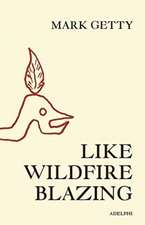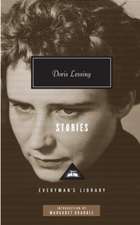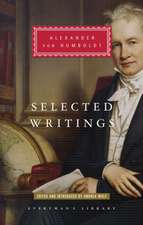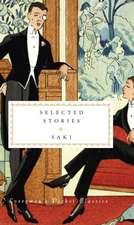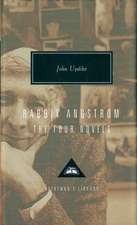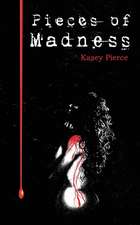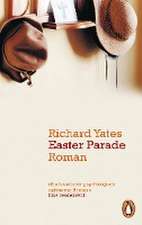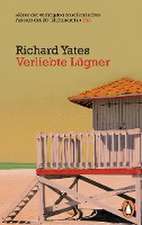Revolutionary Road, The Easter Parade, Eleven Kinds of Loneliness: Everyman’s Library Contemporary Classics
Autor Richard Yatesen Limba Engleză Hardback – 27 feb 2009
| Toate formatele și edițiile | Preț | Express |
|---|---|---|
| Hardback (2) | 97.10 lei 26-32 zile | +43.65 lei 7-13 zile |
| EVERYMAN – 27 feb 2009 | 97.10 lei 26-32 zile | +43.65 lei 7-13 zile |
| Everyman's Library – 31 dec 2008 | 194.89 lei 3-5 săpt. |
Din seria Everyman’s Library Contemporary Classics
- 13%
 Preț: 63.22 lei
Preț: 63.22 lei - 33%
 Preț: 73.22 lei
Preț: 73.22 lei - 14%
 Preț: 73.20 lei
Preț: 73.20 lei - 14%
 Preț: 72.09 lei
Preț: 72.09 lei - 16%
 Preț: 69.63 lei
Preț: 69.63 lei - 20%
 Preț: 86.42 lei
Preț: 86.42 lei - 16%
 Preț: 84.69 lei
Preț: 84.69 lei -
 Preț: 108.78 lei
Preț: 108.78 lei - 16%
 Preț: 91.68 lei
Preț: 91.68 lei - 17%
 Preț: 78.60 lei
Preț: 78.60 lei - 16%
 Preț: 86.07 lei
Preț: 86.07 lei - 15%
 Preț: 82.31 lei
Preț: 82.31 lei - 14%
 Preț: 105.19 lei
Preț: 105.19 lei - 13%
 Preț: 90.96 lei
Preț: 90.96 lei - 16%
 Preț: 90.65 lei
Preț: 90.65 lei - 14%
 Preț: 95.08 lei
Preț: 95.08 lei - 15%
 Preț: 88.31 lei
Preț: 88.31 lei - 15%
 Preț: 104.91 lei
Preț: 104.91 lei - 13%
 Preț: 96.51 lei
Preț: 96.51 lei - 15%
 Preț: 93.85 lei
Preț: 93.85 lei - 13%
 Preț: 96.40 lei
Preț: 96.40 lei - 14%
 Preț: 95.88 lei
Preț: 95.88 lei - 15%
 Preț: 88.28 lei
Preț: 88.28 lei -
 Preț: 111.32 lei
Preț: 111.32 lei -
 Preț: 196.99 lei
Preț: 196.99 lei -
 Preț: 177.32 lei
Preț: 177.32 lei -
 Preț: 111.02 lei
Preț: 111.02 lei - 13%
 Preț: 62.73 lei
Preț: 62.73 lei
Preț: 97.10 lei
Preț vechi: 111.73 lei
-13% Nou
Puncte Express: 146
Preț estimativ în valută:
18.58€ • 19.40$ • 15.38£
18.58€ • 19.40$ • 15.38£
Carte disponibilă
Livrare economică 20-26 martie
Livrare express 01-07 martie pentru 53.64 lei
Preluare comenzi: 021 569.72.76
Specificații
ISBN-13: 9781841593173
ISBN-10: 1841593176
Pagini: 696
Dimensiuni: 138 x 212 x 40 mm
Greutate: 0.71 kg
Editura: EVERYMAN
Seria Everyman’s Library Contemporary Classics
Locul publicării:United Kingdom
ISBN-10: 1841593176
Pagini: 696
Dimensiuni: 138 x 212 x 40 mm
Greutate: 0.71 kg
Editura: EVERYMAN
Seria Everyman’s Library Contemporary Classics
Locul publicării:United Kingdom
Notă biografică
Richard Yates
Extras
FROM THE INTRODUCTION BY RICHARD PRICE
As crystalline as he was on the page, in the flesh Richard Yates was a magnificent wreck, a chaotic and wild-hearted presence, a tall but stooped smoke-cloud of a man, Kennedyesque in dress and manner, gaunt and bearded with hung eyes and a cigarette-slaughtered voice, the words barreling out of him in a low breathless rumble as ash flew into salads, into beer mugs, into the laps of others with every gesture, his demeanor invariably lurching between courtly-solicitous and edge-of-bitter cavalier.
I first met Yates in 1974 at the School of the Arts, Columbia University, in an MFA fiction workshop. For a few thousand dollars a semester, he entered the room every week wearing a nubby sports jacket and askew knit tie to critique and counsel a table of students sporting frayed bell-bottoms, Prince Valiant bangs and sarcastic hats. It had been thirteen years since Revolutionary Road. Disturbing the Peace was a year away.
We were in our early twenties, and most of us had neither read nor even heard of him. In class he called you by your last name, no title: a brusque, slightly boarding-schoolish and utterly seductive form of address. He regularly and passionately savaged those writers whom he perceived to be his more validated (‘‘lucky,’’ he called them) peers, but he treated a student’s work, no matter how hapless, with shocking earnestness.
He was a nurturer of grudges; an incubator of slights.
His personal gods were Hemingway and Fitzgerald.
He was bitter.
As crystalline as he was on the page, in the flesh Richard Yates was a magnificent wreck, a chaotic and wild-hearted presence, a tall but stooped smoke-cloud of a man, Kennedyesque in dress and manner, gaunt and bearded with hung eyes and a cigarette-slaughtered voice, the words barreling out of him in a low breathless rumble as ash flew into salads, into beer mugs, into the laps of others with every gesture, his demeanor invariably lurching between courtly-solicitous and edge-of-bitter cavalier.
I first met Yates in 1974 at the School of the Arts, Columbia University, in an MFA fiction workshop. For a few thousand dollars a semester, he entered the room every week wearing a nubby sports jacket and askew knit tie to critique and counsel a table of students sporting frayed bell-bottoms, Prince Valiant bangs and sarcastic hats. It had been thirteen years since Revolutionary Road. Disturbing the Peace was a year away.
We were in our early twenties, and most of us had neither read nor even heard of him. In class he called you by your last name, no title: a brusque, slightly boarding-schoolish and utterly seductive form of address. He regularly and passionately savaged those writers whom he perceived to be his more validated (‘‘lucky,’’ he called them) peers, but he treated a student’s work, no matter how hapless, with shocking earnestness.
He was a nurturer of grudges; an incubator of slights.
His personal gods were Hemingway and Fitzgerald.
He was bitter.
Recenzii
“To me and to many other writers of my generation, the work of Richard Yates came as a liberating force . . . He was one of the most important and influential writers of the second half of the century.” —Robert Stone
“It is Yates’s relentless, unflinching investigation of our secret hearts, and his speaking to us in language as clear and honest and unadorned and unsentimental and uncompromising as his vision, that makes him such a great writer.” —Richard Russo
“It is Yates’s relentless, unflinching investigation of our secret hearts, and his speaking to us in language as clear and honest and unadorned and unsentimental and uncompromising as his vision, that makes him such a great writer.” —Richard Russo


